The politics of Vatican City take place in a framework of a theocratic absolute elective monarchy, in which the Pope, religiously speaking, the leader of the Catholic Church and Bishop of Rome, exercises ex officio supreme legislative, executive, and judicial power over the Vatican City as it is being governed by the Holy See, a rare case of non-hereditary monarchy.

Jacques Daniel Michel Piccoli was a French actor, producer and film director with a career spanning 70 years. He was lauded as one of the greatest French character actors of his generation who played a wide variety of roles and worked with many acclaimed directors, being awarded with a Best Actor Award at the Cannes Film Festival and a Silver Bear for Best Actor at the Berlin Film Festival.
Universi Dominici gregis is an apostolic constitution of the Catholic Church issued by Pope John Paul II on 22 February 1996. It superseded Pope Paul VI's 1975 apostolic constitution, Romano Pontifici eligendo, and all previous apostolic constitutions and orders on the subject of the election of the Roman Pontiff.

A papal conclave is a gathering of the College of Cardinals convened to elect a bishop of Rome, also known as the pope. Catholics consider the pope to be the apostolic successor of Saint Peter and the earthly head of the Catholic Church.

A papal conclave was held on 18 and 19 April 2005 to elect a successor to John Paul II, who had died on 2 April 2005. Upon the pope's death, the cardinals of the Catholic Church who were in Rome met and set a date for the beginning of the conclave. Of the 117 eligible members of the College of Cardinals, those younger than 80 years of age at the time of the death of Pope John Paul II, all but two attended. After several days of private meetings attended by both cardinal electors and non-voting cardinals, the conclave began on 18 April 2005. It ended the following day after four ballots with the election of Cardinal Joseph Ratzinger, Dean of the College of Cardinals and Prefect of the Congregation for the Doctrine of the Faith. After accepting his election, he took the name Benedict XVI.

The papal conclave held on 25 and 26 August 1978 was the first of the two held that year. It was convoked to elect a successor to Paul VI, who had died on 6 August 1978. After the cardinal electors assembled in Rome, they elected Cardinal Albino Luciani, Patriarch of Venice, as the new pope on the fourth ballot. He accepted the election and took the name John Paul I.

A papal conclave took place from 25 to 28 October following the death of Pope Pius XII on 9 October 1958. On the eleventh ballot, the College of Cardinals elected Cardinal Angelo Giuseppe Roncalli as the new pope. He accepted the election and took the name John XXIII. He was the second patriarch of Venice to be elected pontiff in the 20th century after Pius X.

The papal conclave held from 2 to 6 February 1922 saw Cardinal Achille Ratti elected to succeed Benedict XV, who had died on 22 January 1922. It took fourteen ballots for the 53 of the 60 cardinals assembled in the Sistine Chapel to elect a new pope. Ratti took the name Pius XI and immediately revived the traditional public blessing from the balcony, Urbi et Orbi, which his predecessors had eschewed since the loss of Rome to the Italian state in 1870.
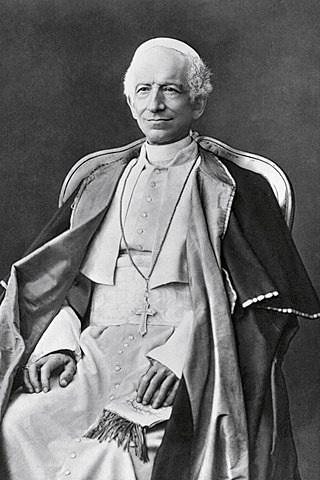
The papal conclave held from 18 to 20 February 1878 saw the election of Vincenzo Pecci, who took the name Leo XIII as pope. Held after the death of Pius IX, who had had the longest pontificate since Saint Peter, it was the first election of a pope who would not rule the Papal States. It was the first to meet in the Apostolic Palace in the Vatican because the venue used earlier in the 19th century, the Quirinal Palace, was now the palace of the king of Italy, Umberto I.
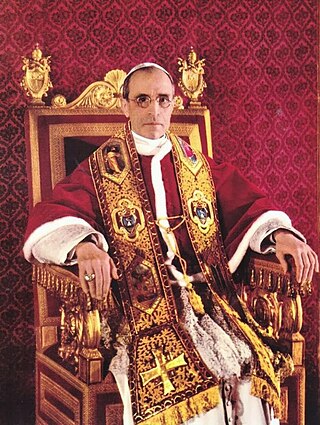
The papal conclave held on 1 and 2 March 1939 saw Cardinal Eugenio Pacelli elected on the third ballot to succeed Pius XI, who had died on 10 February, as pope. All 62 cardinals took part. Pacelli, who had been camerlengo and secretary of state, took the name Pius XII. The day was his 63rd birthday.
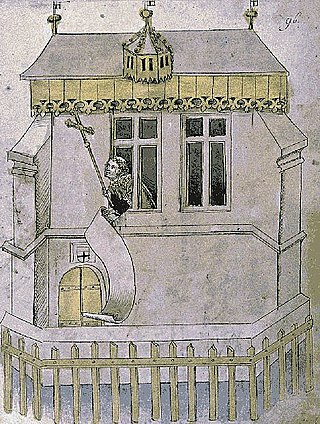
Habemus papam or Papam habemus is the announcement traditionally given by the protodeacon of the College of Cardinals or by the senior cardinal deacon participating in the papal conclave, in Latin, upon the election of a new pope of the Roman Catholic Church.

Giovanni "Nanni" Moretti is an Italian film director, producer, screenwriter, and actor.

The 1464 papal conclave, convened after the death of Pope Pius II, elected as his successor cardinal Pietro Barbo, who took the name Paul II.

In the papal conclave held from 8 to 9 February 1621, Cardinal Alessandro Ludovisi was elected to succeed Paul V as pope. Ludovisi took the name Gregory XV. It was the shortest conclave in the seventeenth century.
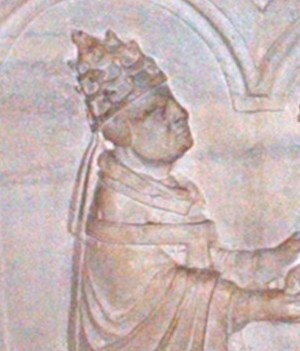
The 1378 papal conclave which was held from April 7 to 9, 1378, was the papal conclave which was the immediate cause of the Western Schism in the Catholic Church. The conclave was one of the shortest in the history of the Catholic Church. The conclave was also the first since 1159 held in the Vatican and in Old St. Peter's Basilica.

Francesco Maidalchini was an Italian Cardinal of the Roman Catholic Church.
The Room of Tears, also called The Crying Room, is a small antechamber within The Sistine Chapel in Vatican City, where a newly elected pope changes into his papal cassock for the first time.
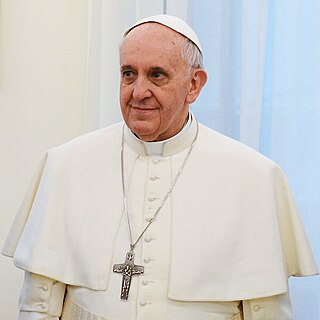
A conclave was convened on 12 March 2013 to elect a pope to succeed Benedict XVI, who had resigned on 28 February. 115 participating cardinal-electors gathered. On the fifth ballot, the conclave elected Cardinal Jorge Mario Bergoglio, SJ, Archbishop of Buenos Aires. He took the pontifical name Francis.
Ingravescentem aetatem is a document issued by Pope Paul VI, dated 21 November 1970. It is divided into 8 chapters. The Latin title is taken from the incipit, and translates to "advancing age". It established a rule that only cardinals who have not reached the age of 80 can participate in a conclave.
Pope Pius XI instituted a new rule for setting the date for the start of a papal conclave to elect a new pope by promulgating the document Cum proxime on 1 March 1922, less than a month after his own election. The four non-European cardinals had not participated in the conclave that elected him in February. Three of them arrived too late and one did not attempt the journey. With Cum proxime, Pius XI extended the time between the death of a pope and the start of the conclave to increase the likelihood that cardinals from distant locations could reach Rome in time to participate.
















